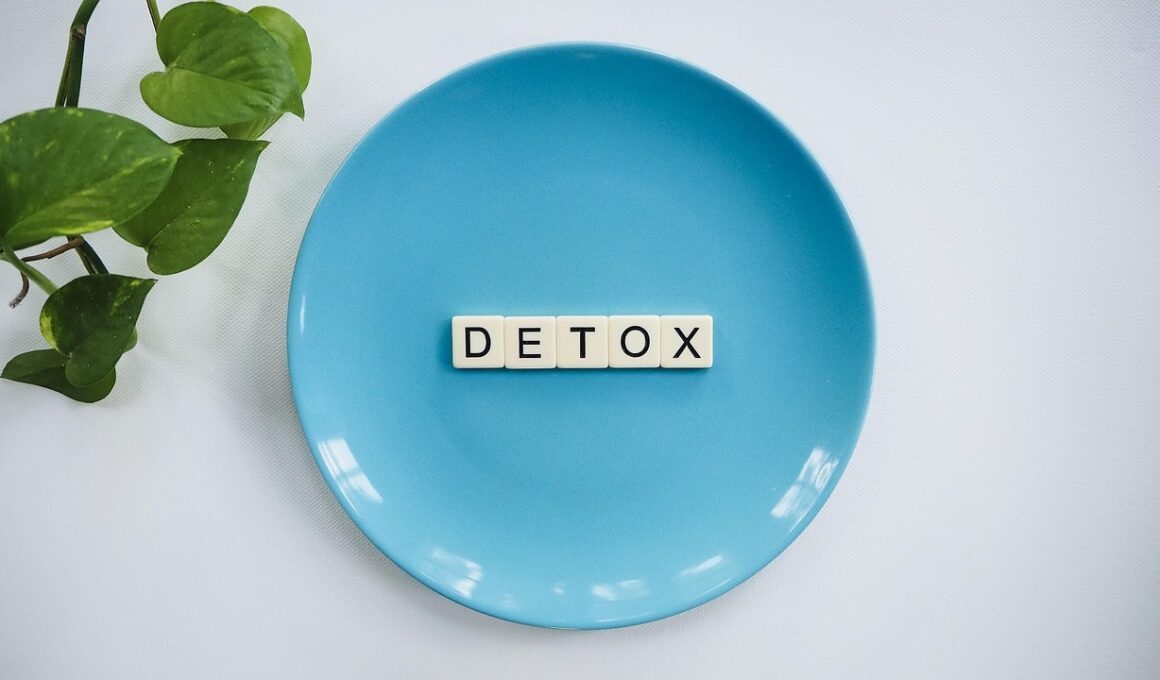The Impact of Processed Foods on Liver Function and Detox Diets
The liver plays an indispensable role in detoxification, processing vital nutrients, and filtering toxins from our bloodstream. Processed foods have become ubiquitous in modern diets, often laden with preservatives, artificial flavors, and high levels of sugar and unhealthy fats. This excessive consumption can overwhelm the liver, impairing its functionality and disturbing normal metabolic processes. Consequently, the liver’s ability to detoxify the body efficiently may be compromised. Foods such as processed meats, sugary snacks, and packaged meals contribute to the buildup of toxic substances, forcing the liver to work harder. As a result, individuals may experience feelings of fatigue and discomfort. Therefore, for anyone looking to engage in a liver detoxification diet, it is crucial to minimize processed food intake. Instead, focus on incorporating fresh, whole foods into your diet, emphasizing organic fruits, vegetables, lean proteins, and healthy fats. These choices provide vital nutrients that support liver health while aiding in the detoxification process. Furthermore, regular hydration and physical activity also promote optimal liver function, enhancing the effectiveness of any detox diet undertaken.
Liver Function and Detoxification
The liver is one of the largest organs in the body, performing a wide range of functions essential for maintaining good health. Detoxification is one of its primary roles, helping to eliminate harmful substances. Proper liver function is crucial in metabolizing drugs and processing nutrients from food, turning nutrients into vital substances for the body. However, when subjected to a diet high in processed foods, the liver can become overburdened. The introduction of additives and synthetic substances in these foods can lead to liver stress, causing oxidation and inflammation. Over time, these factors can result in conditions such as fatty liver disease or cirrhosis. Detox diets typically promote natural food sources such as vegetables, fruits, lean proteins, and nuts. These foods supply antioxidants that can combat oxidative stress on the liver. Incorporating foods rich in sulfur, like garlic and onions, helps enhance detoxification pathways. Engaging in a balanced diet aids in replenishing the liver’s nutrient reserves, allowing it to function optimally. With good dietary choices, individuals can significantly enhance their liver health and overall well-being while minimizing the harmful effects of processed foods.
Processed foods significantly disrupt the delicate balance of liver function. High levels of sugar, especially fructose and artificial sweeteners, are notorious culprits in the modern diet. Such ingredients can promote fat accumulation in the liver and insulin resistance, setting the stage for more severe metabolic issues. Additionally, trans fats found in a variety of packaged snacks can lead to inflammation, further compromising liver health. Interestingly, studies indicate a correlation between processed food consumption and increased liver enzyme levels. The resulting elevated liver enzymes may serve as a warning sign of liver damage. Therefore, replacing processed foods with whole, unprocessed foods is essential for supporting liver detoxification. Foods such as avocados, apples, and leafy greens are nutrient-dense and promote liver health. Additionally, drinking green tea, known for its antioxidant properties, bolsters liver function and supports detoxification pathways. Ultimately, to achieve a successful liver detox, one must gradually eliminate processed foods from their diet. Foster healthy eating habits by cooking at home, choosing organic ingredients, and avoiding packaged meals. These conscious choices can help restore liver health and promote efficient detoxification processes in the body.
Understanding the relationship between diet and liver health is essential for anyone contemplating detox diets. Engaging in a detoxification process requires more than just abstaining from unhealthy foods; it involves embracing a holistic lifestyle change. The liver needs support from nutrient-rich foods that enhance its natural detoxification capabilities. Fibrous foods, such as legumes and whole grains, play significant roles in promoting proper digestive function, which is integral to detoxification. When the digestive system operates efficiently, the liver can effectively filter out harmful substances. Moreover, incorporating healthy fats like omega-3 fatty acids found in fish or flaxseeds nourishes liver cells and reduces inflammation. During the detox process, individuals might also consider herbal supplements known for supporting liver function. For instance, milk thistle may protect the liver from toxins while promoting regeneration. It’s essential, however, to consult with a healthcare professional before adding supplements to avoid unwanted interactions. Understanding food choices, how they affect the liver, and the necessity for a detox diet allows individuals to empower themselves with knowledge for long-term health benefits.
The Role of Hydration
Staying well-hydrated is another crucial factor in maintaining liver health and enhancing detox diets. Water plays a fundamental role in supporting liver function, particularly during a detoxification phase. Adequate hydration facilitates the elimination of toxins by aiding kidney function, as both organs collaborate in the detoxification process. By drinking sufficient water, individuals can assist their liver in flushing out harmful substances more effectively. Herbal teas, such as dandelion or ginger tea, can also contribute positively to liver health. Not only do they provide hydration, but they also encompass specific properties that promote liver detoxification. Furthermore, incorporating hydrating foods like cucumbers, watermelon, and oranges in meals ensures that your body is receiving essential liquids and nutrients. Limiting caffeine and alcohol intake during this cleansing process is advisable, as these substances can cause dehydration and further stress the liver. The impact of hydration on liver function emphasizes the importance of prioritizing fluid intake throughout any detox diet. Ultimately, maintaining hydration leads to a smoother, more efficient detoxification process, supporting overall health goals.
Another important aspect of liver detox diets is timing and meal frequency. When embarking on liver detoxification, it’s essential to consider when and how often you eat. Studies suggest that smaller, more frequent meals can reduce the liver’s workload, allowing it to process nutrients more effectively. Eating every three to four hours can stabilize blood sugar levels. This approach prevents spikes and drops that may lead to increased stress on the liver. Moreover, consuming a balanced breakfast rich in fiber and protein sets a favorable tone for the rest of the day while providing sustained energy. Individuals can enhance their diets further by ensuring they include timed intake of liver-supporting nutrients. For example, consuming leafy greens in prior meals could provide the liver with what it needs to function optimally. Additionally, snacks consisting of nuts or fruits are great options to support metabolism. Balancing meal timing with liver-supporting foods offers a powerful strategy in optimizing detox diets. The cumulative effect of these practices can empower individuals to establish healthier habits beyond the detox phase, leading to lasting changes in overall well-being.
Conclusion: Integrating Healthy Choices
The path to better liver health through detox diets revolves around integrating healthy food choices into daily life. Processed foods pose a considerable risk to liver function and overall health, with their negative impacts becoming increasingly evident. Transitioning to a liver-friendly diet involves a commitment to consume whole, organic, and minimally processed foods. Establishing this foundation can significantly alleviate the burden on the liver while enabling its natural detoxification processes. Incorporating a variety of nutrients from diverse food groups will provide the liver with the necessary tools to maintain optimal health. Consistent efforts in promoting liver health can lead to improved energy levels, better digestion, and an overall sense of vitality. Emphasizing hydration and proper meal timing complements healthful food selections, ensuring the liver functions efficiently. Lastly, engaging in regular physical activity enhances the effects of a detox diet. Ultimately, the journey towards a healthier liver is unique for everyone. Armed with the knowledge of how processed foods influence liver function, individuals can make informed lifestyle choices aimed at fostering long-term wellness.
This is the final paragraph with exactly 190 words.


